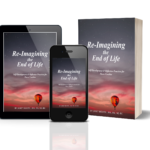‘Death cafe hot spot’
‘
I have a new term for an unintended consequence of my work as an end-of-life coach and educator. As I move through the world, I’ve become a ‘death café hot spot.’ A death café is a global phenomenon where people, often strangers, gather to drink tea and discuss death. The objective is to increase awareness of death with a view to helping people make the most of their (finite) lives. A ‘hot spot’ usually refers to a physical location where people can obtain access to the Internet, and it could emanate from a business or from an individual’s mobile device.
When I’m asked by people what kind of work I do, my short explanation of “I’m taking my experience as a hospice and palliative care nurse out into communities, to change and transform the conversation we’re having about death and dying” seems to work as a ‘hot spot’ for people to access their stories about illness, death, grief, and caregiving. The location varies from airplanes to supermarkets to cafes to dinner parties, from hair salons to hiking trails to churches to Lyft rides. Apparently, the ‘hot spot’ can be activated anywhere I go. I used to joke that I could clear a room at a cocktail party by saying I was a hospice nurse. That’s not true anymore.
It’s as if people are hungry to tell their stories of caring for people who were dying, or being with people who died, or of living with serious illness. The death-phobia and reluctance to talk about dying in our No. American culture has shut down many important conversations…there’s no connection available. Then along comes a hospice nurse or end-of-life coach or death doula with a ‘hot spot’ and suddenly the connection is made and the stories start coming.
“I took care of my mom when she was dying and it was the best and hardest thing I’ve ever done…”
“I’m still upset that my parents didn’t tell me my grandfather was dying and I never got to say goodbye…”
“I don’t know how to talk with my adult children about why I want to stop my cancer treatments…”
“I feel so much guilt that I abandoned my best friend when she was dying, because I didn’t know what to say or how to make things better…”
“I just heard this awesome podcast about home funerals and green burials and it’s the coolest thing ever…”
“I’m still so angry at my siblings for not agreeing to stop treatments and tests that were torturing my mom in her last days…”
“If I was told I had a short time to live, I’d do things very differently than I’m doing now…”
These are just a few of the opening sentences to stories I’ve been fortunate to hear. If I don’t have the time or bandwidth to hear the story in front of me, I will move on my way with as much kindness as I can. But mostly, it’s a real privilege to make connections on that level with total strangers who are sharing snippets from some of the most challenging and meaningful times in their lives.
It’s a different venue from the hospice bedside, but it’s the same work…
Creating a safe space where humans can share in an authentic way about the experience of living with dying.


